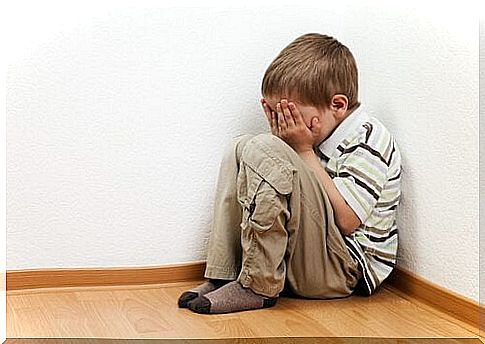Understanding The Fear Of Being Alone

Every day, many mothers and fathers have to grapple with the fear of their children being alone. This is one of the most common fears of children, especially young children.
Most of the time, the fear of being alone develops between the ages of 2 and 5. If families don’t handle it properly, it can have a huge impact on children’s emotional health.
In some cases, the fear of being alone can be coupled with a fear of the dark and thus the need to sleep with the night light on. It can also appear along with other common childhood fears such as monsters and clowns.
Whatever a child is afraid of, parents should take their children’s fears seriously in order to help them.
How children perceive time
One of the reasons children’s fear of being alone is that they experience the passage of time differently from adults.
You notice this, for example, when you promise them a treat: Children keep asking whether the time has come and don’t accept the answer “later”.
The reason for this is that children perceive the passage of time differently. To a young child, a few minutes can seem like an eternity.
So if a child is the last to be picked up from school because mom or dad is a few minutes late, the wait seems to take hours.
This can even lead to a panic attack. Some children find it difficult to recover from this experience. You may be afraid of going back to kindergarten or school.

The fear of being alone is normal
Almost every child on earth feels a fear of being alone at some point in their childhood. This is normal and nothing to worry about.
Even when children are around other people, they can be afraid of being left alone.
For example, some children are afraid of being dropped off at school even though they are surrounded by other children there. In this case, the fear is due to a feeling of insecurity.
Children can also feel alone playing in their room, even though they know their parents are nearby. This fear often arises in babies when they are taken away by someone other than the mother or father.
How to take away children’s fear of being alone
As parents, one of our jobs is to help our children overcome difficulties in their lives. One of these difficulties is the fear of being alone.
1. Take your child’s fears seriously
No matter how small or insignificant a child’s worries are, they should never be downplayed. If you downplay your children’s worries, they only learn that they cannot confide in their parents.
2. Don’t teach them to be fearful
Some parents make the mistake of scaring their children into achieving certain things. Threats like “If you don’t go to bed now, the specter will come and get you.” create an anxious atmosphere.
When children grow up in such an environment, they tend to be insecure, anxious, and have greater difficulty confronting their fears.
On the other hand, it’s easy to be overly cautious. For example, when children have a problem in kindergarten or school, the temptation is to go and solve it for them.
However, it is important that children solve problems on their own. In this way, they gain confidence and self-esteem.

3. Try to understand their fears
Instead of forcing children to face their fears prematurely, ask them what they are afraid of and why. Instead of forcing children to face their fears before they are ready, ask them what they are afraid of and why. Trying to understand their fear of being alone will give you the tools you need to deal with the problem.
When you talk to your child about it, you should give them your full attention.
This is how your little one can see that you are interested in their problems. In the future, your child will feel much more comfortable telling you about their experiences.
Don’t forget that fear of being alone is perfectly normal in young children. With your help and support, your child will be able to overcome them.









